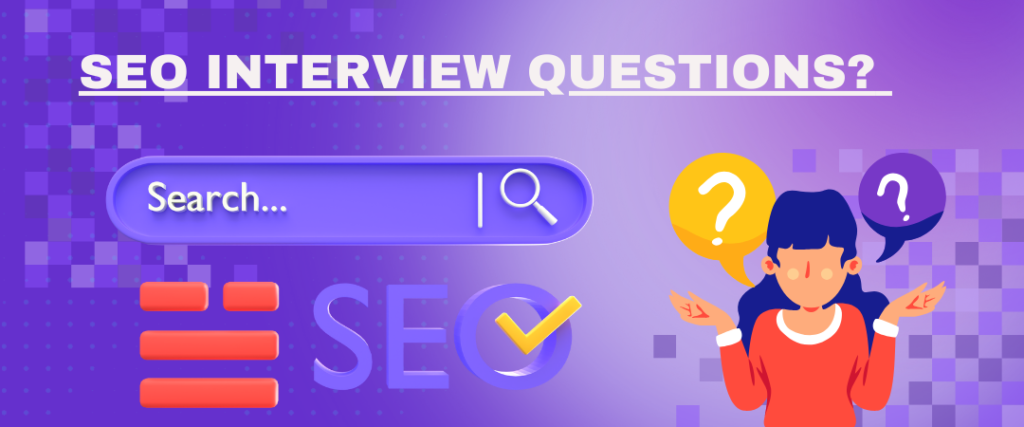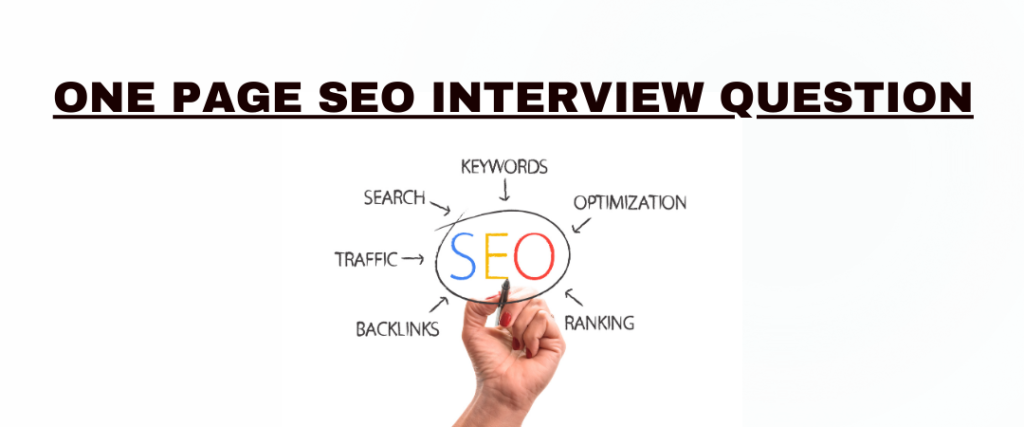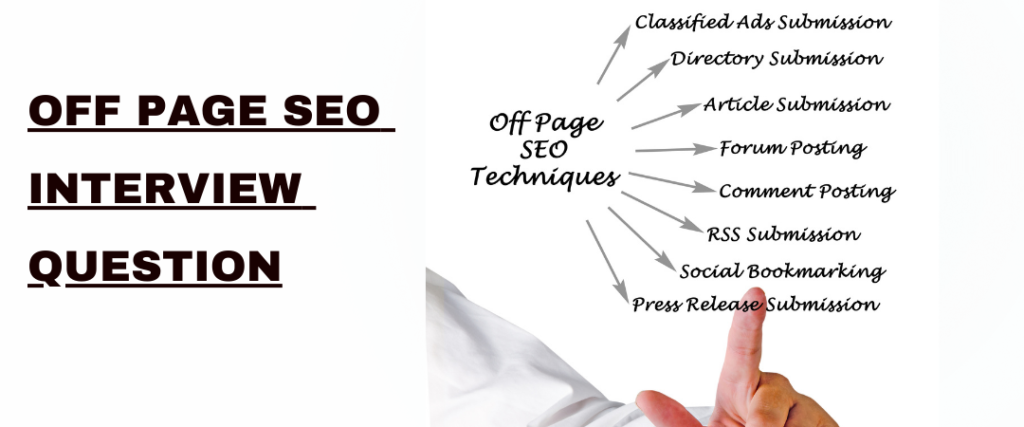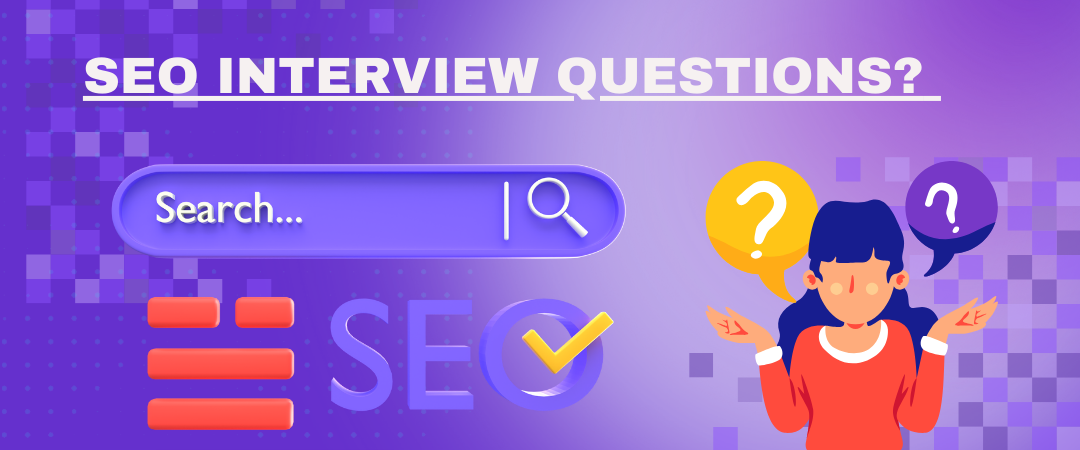SEO Interview Questions?
Last updated on March 5th, 2024 at 12:36 pm

Meta tags, specifically the meta title and meta description, are crucial elements of on-page SEO. They play a significant role in improving a webpage’s visibility on search engine results pages (SERPs) and attracting clicks from users. Here’s how you can approach crafting effective meta tags:
- Meta Title:
- The meta title is a concise and accurate representation of the webpage’s content. It should include relevant keywords to signal the topic to search engines. Aim for a length of around 50-60 characters to ensure it displays well in search results. Make it compelling and aligned with the user’s intent to encourage clicks.
- Meta Description:
- The meta description provides a brief summary of the page’s content. While it doesn’t directly impact rankings, it influences click-through rates. Craft a compelling description within the recommended length of 150-160 characters. Include key information and a call to action to entice users to click on the link.
- Relevance to Content:
- Ensure that both the meta title and meta description accurately reflect the content of the webpage. Misleading or irrelevant meta tags can lead to a poor user experience and impact the credibility of the website.
- Keyword Optimization:
- Incorporate relevant keywords in both the meta title and meta description. This helps search engines understand the topic and can improve the page’s chances of ranking for those keywords.
- Unique and Descriptive:
- Make each meta title and meta description unique to the specific page. Avoid duplicate tags across different pages to provide distinct information for users and search engines.
- Call to Action (CTA):
- Consider including a call to action in the meta description to prompt user engagement. Whether it’s encouraging users to read more, sign up, or explore a product, a well-crafted CTA can positively impact click-through rates.
- Regular Review and Update:
- Periodically review and update meta tags to align with changes in content or to optimize for evolving search trends. Keeping meta tags current ensures they continue to effectively represent the webpage.
Here are some on-page SEO-related questions along with brief answers:

- What is On-Page SEO?
- On-page SEO refers to the optimization of individual web pages to improve their visibility in search engine results and attract relevant organic traffic.
- Why is On-Page SEO Important?
- On-page SEO is crucial for search engines to understand and rank your content accurately, leading to increased visibility, traffic, and better user experiences.
- What is the Title Tag, and How does it Impact SEO?
- The title tag is an HTML element defining the title of a webpage. It directly influences click-through rates and search engine rankings.
- How Long Should a Title Tag Be for Optimal SEO?
- Aim for titles between 50-60 characters to ensure they display well in search results.
- What is a Meta Description, and Why is it Important for SEO?
- A meta description is an HTML attribute providing a brief summary of a webpage. While not a direct ranking factor, it influences click-through rates.
- How Can You Optimize a Meta Description for Better Results?
- Craft a concise and compelling description that accurately represents the content and includes relevant keywords.
- What is the Purpose of Header Tags (H1, H2, H3, etc.) in On-Page SEO?
- Header tags structure content, helping search engines understand the hierarchy and importance of information on a page.
- Why is it Important to Include Keywords in Header Tags?
- Including keywords in header tags helps signal the relevance of content to search engines.
- How Do You Choose Relevant Keywords for On-Page SEO?
- Conduct keyword research using tools like Google Keyword Planner, considering relevance, search volume, and user intent.
- Explain the Significance of Keyword Placement in On-Page Optimization.
- Strategic placement of keywords in titles, headers, and throughout content helps search engines understand the topic and relevance of the page.
- What is the Ideal Keyword Density in a Piece of Content?
- Focus on natural and user-friendly content; avoid keyword stuffing. There’s no specific ideal density, but it’s generally recommended to prioritize readability.
- How Does URL Structure Impact On-Page SEO?
- A clean, descriptive URL contributes to better user experience and search engine understanding. Include relevant keywords and use hyphens to separate words.
- Describe the Characteristics of a Search Engine-Friendly URL.
- Short, descriptive, and containing relevant keywords, with hyphens to separate words. Avoid unnecessary parameters.
- What is Image Optimization, and Why is it Important for SEO?
- Image optimization involves reducing file sizes, using descriptive filenames, and adding alt text. It improves page load times and provides context to search engines.
- How Can You Optimize Images for Faster Page Load Times?
- Compress images, choose appropriate file formats, and use lazy loading to optimize images for faster loading.
- What is Alt Text, and How Does it Contribute to On-Page SEO?
- Alt text provides a textual description of an image, aiding accessibility and providing context to search engines for image content.
- Why is it Important to Have a Mobile-Friendly Website for On-Page SEO?
- Google prioritizes mobile-friendly websites, and mobile responsiveness enhances user experience, contributing to better rankings.
- How Does Mobile Responsiveness Impact Search Engine Rankings?
- Google favors mobile-friendly websites and may rank them higher in search results, especially for mobile searches.
- What Role Does Page Load Speed Play in On-Page SEO?
- Page load speed is a Google ranking factor. Faster-loading pages enhance user experience and contribute to improved rankings.
- Name Some Techniques to Improve Page Load Speed.
- Compress images, enable browser caching, minimize HTTP requests, and use a content delivery network (CDN) to improve page load speed.
- How Can You Use Internal Linking to Enhance On-Page SEO?
- Strategically link to other pages within your website to distribute link equity, establish content hierarchy, and improve navigation.
- What is the Importance of Anchor Text in Internal Linking?
- Anchor text provides context for the linked page. Use descriptive and relevant anchor text to enhance user experience and signal content relevance to search engines.
- How Does External Linking Affect On-Page SEO?
- External links to reputable sources can enhance your content’s credibility and authority. However, ensure relevance and quality of external links.
- Explain the Concept of Canonical Tags and Their Role in On-Page SEO.
- Canonical tags specify the preferred version of a URL, preventing duplicate content issues and consolidating link equity.
- Why is Content Quality Crucial for On-Page Optimization?
- High-quality, relevant, and engaging content satisfies user intent, improves search engine rankings, and enhances overall user experience.
- How Can You Create High-Quality, Engaging Content for SEO?
- Understand your audience, conduct thorough research, and craft content that addresses their needs, questions, or interests.
- What is the Difference Between Evergreen Content and Trending Content?
- Evergreen content remains relevant over time, while trending content addresses current topics or trends. A balanced content strategy may include both.
- How Do You Optimize Content for Featured Snippets?
- Structure content with clear headings and concise answers to common questions. Address the user’s query directly to increase the chances of being featured.
- What is the Impact of Duplicate Content on On-Page SEO?
- Duplicate content can confuse search engines, dilute link equity, and negatively impact rankings. It’s essential to address and prevent duplicate content issues.
- How Can You Address and Prevent Duplicate Content Issues?
- Use canonical tags, set preferred URL versions, and avoid using identical content across multiple pages.
- What Are Meta Robots Tags, and How Do They Influence SEO?
- Meta robots tags provide instructions to search engines about how to crawl and index a page. They can control aspects like noindex, nofollow, and more.
- Explain the Significance of Schema Markup in On-Page SEO.
- Schema markup provides structured data that helps search engines better understand the content and context of a page, potentially leading to rich snippets in search results.
- How Do You Optimize a Webpage for Local SEO?
- Include location-specific keywords, claim and optimize your Google My Business listing, and encourage customer reviews for local SEO optimization.
- What Role Do User Signals Play in On-Page SEO?
- User signals, such as click-through rate (CTR) and dwell time, can indirectly influence search engine rankings, indicating user satisfaction with the content.
- How Can You Use Social Media to Enhance On-Page Optimization?
- Share content on social media platforms to increase visibility, drive traffic, and encourage engagement. Social signals may have an indirect impact on SEO.
- What is the Importance of User Experience (UX) in On-Page SEO?
- A positive user experience, including easy navigation, readability, and fast load times, contributes to higher
Off-Page SEO Interview Question

Backlinks are crucial in off-page SEO as they are considered a vote of confidence and a signal of authority and relevance from other websites. High-quality backlinks contribute to a website’s credibility, improve its search engine rankings, and increase organic traffic. Here’s how one might approach building high-quality backlinks:
- Understanding Quality Backlinks:
- High-quality backlinks come from reputable and authoritative websites within the same or related industry. They are relevant to the content they link to and contribute to the overall user experience.
- Content Quality:
- Create high-quality and valuable content that others in your industry would find useful. Quality content naturally attracts backlinks as other websites reference and link to it.
- Guest Posting:
- Identify reputable websites in your industry and offer to contribute guest posts. Ensure that the content is informative, relevant, and provides value to the target audience. Include a natural link back to your website within the author bio or content.
- Broken Link Building:
- Find websites within your industry that have broken links, and offer your content as a replacement. This approach not only helps the website owner by fixing broken links but also provides you with an opportunity to earn a backlink.
- Social Media Engagement:
- Actively engage on social media platforms by sharing your content. When your content gets shared and discussed, it increases the likelihood of others linking back to it.
- Build Relationships:
- Establish relationships with influencers, bloggers, and other website owners in your industry. Genuine relationships can lead to natural backlink opportunities as they reference your content or collaborate with you.
- Skyscraper Technique:
- Identify popular content in your industry and create something even better. Reach out to websites that linked to the original content and inform them about your improved version, increasing the chances of them linking to your content instead.
- Participate in Industry Forums and Communities:
- Engage in forums and online communities relevant to your industry. Share your expertise, provide valuable insights, and include a link to your website when relevant. This can lead to natural backlinks as others reference your contributions.
- Local Citations:
- Ensure your business is listed on relevant local directories and industry-specific platforms. Consistent and accurate citations contribute to local SEO and can generate backlinks.
- Monitor Competitor Backlinks:
- Analyze the backlink profiles of your competitors. Identify websites that link to them and consider reaching out to those sites to see if they would be interested in linking to your content as well.
- Educational and Governmental Links:
- Aim for links from educational institutions or government websites. Such links are often considered highly authoritative and can significantly impact your website’s credibility.
- Monitor Backlink Quality:
- Regularly monitor your backlink profile using tools like Google Search Console or third-party tools. Disavow low-quality or spammy backlinks to maintain a healthy link profile.
Here are some off-page SEO-related questions along with brief answers:
- What is Off-Page SEO?
- Off-page SEO refers to the activities performed outside of your website that influence its visibility and rankings on search engine results pages (SERPs).
- Why are Backlinks Important for Off-Page SEO?
- Backlinks are important because they act as votes of confidence, indicating the authority and relevance of your content to search engines.
- What is the Difference Between Do-Follow and No-Follow Links?
- Do-follow links pass link equity and influence rankings, while no-follow links do not. Both types are essential for a natural link profile.
- How Do Social Signals Impact Off-Page SEO?
- Social signals, such as likes, shares, and comments on social media platforms, can indirectly impact SEO by increasing brand visibility and driving traffic.
- What is Guest Posting, and How Does it Contribute to Off-Page SEO?
- Guest posting involves writing and publishing content on other websites. It helps build backlinks, establish authority, and increase brand exposure.
- Explain the Importance of Social Bookmarking in Off-Page SEO.
- Social bookmarking involves sharing website pages on social platforms. It can generate backlinks and increase the visibility of your content.
- How Can Online Reviews Impact Off-Page SEO?
- Positive online reviews can enhance the reputation of your business and indirectly contribute to local SEO by influencing search engine rankings.
- What is the Purpose of Forum Posting in Off-Page SEO?
- Forum posting involves participating in online forums to engage with the community and build backlinks. It helps establish authority and drive targeted traffic.
- How Do Directory Submissions Contribute to Off-Page SEO?
- Directory submissions involve listing your website in online directories. While less impactful than in the past, they can still contribute to local SEO and provide backlinks.
- What is the Skyscraper Technique in Off-Page SEO?
- The Skyscraper Technique involves creating content that outperforms existing content on a specific topic, then reaching out to websites that linked to the original content to promote yours.
- Explain the Importance of Influencer Marketing in Off-Page SEO.
- Influencer marketing involves collaborating with influencers to promote your brand. It can result in increased brand visibility, traffic, and backlinks.
- How Can Blog Commenting Contribute to Off-Page SEO?
- Meaningful blog comments on relevant websites can build relationships, generate traffic, and sometimes result in no-follow backlinks.
- What is Broken Link Building, and How Does it Work in Off-Page SEO?
- Broken link building involves finding broken links on other websites and offering your content as a replacement. It helps you earn new backlinks.
- How Can Image and Infographic Submission Benefit Off-Page SEO?
- Submitting images and infographics to relevant platforms can lead to backlinks and increased visibility, especially if the content is valuable and shareable.
- What Role Do Edu and Gov Backlinks Play in Off-Page SEO?
- Edu and Gov backlinks are considered authoritative. Getting backlinks from educational or government websites can positively impact your website’s authority.
- Explain the Concept of Link Baiting in Off-Page SEO.
- Link baiting involves creating content that is so compelling or controversial that it naturally attracts backlinks without active promotion.
- How Do Local Citations Affect Off-Page SEO?
- Local citations, consistent mentions of your business information, can improve local SEO and contribute to local pack rankings.
- What is the Importance of Press Releases in Off-Page SEO?
- Press releases can generate media coverage, backlinks, and brand visibility. However, they should be used strategically and not solely for link building.
- How Can Q&A Platforms Like Quora Contribute to Off-Page SEO?
- Participating in Q&A platforms can establish you as an authority in your industry, drive targeted traffic, and occasionally result in backlinks.
- What is Social Media Engagement, and How Does it Impact Off-Page SEO?
- Actively engaging on social media by sharing content, responding to comments, and participating in discussions can improve brand visibility and indirectly influence SEO.
- Explain the Impact of Co-Citations in Off-Page SEO.
- Co-citations occur when your website is mentioned alongside competitors or within similar contexts, contributing to your website’s perceived relevance.
- How Can Testimonials and Reviews Contribute to Off-Page SEO?
- Positive testimonials and reviews on relevant websites can enhance your online reputation and influence local search rankings.
- What is Social Listening, and How Can it Be Used for Off-Page SEO?
- Social listening involves monitoring social media for mentions of your brand. Responding to mentions and engaging with your audience can positively impact your online presence.
- Explain the Importance of Brand Mentions in Off-Page SEO.
- Brand mentions, even without explicit links, can contribute to brand awareness and indirectly impact SEO by influencing online visibility.
- How Can Web 2.0 Platforms Contribute to Off-Page SEO?
- Web 2.0 platforms allow users to create and share content. Utilizing these platforms can generate backlinks and increase your content’s reach.
- What is Video Marketing, and How Can it Impact Off-Page SEO?
- Video marketing involves creating and promoting videos. Engaging videos can attract backlinks, enhance brand visibility, and improve user engagement.
- Explain the Impact of User-Generated Content on Off-Page SEO.
- User-generated content, such as reviews, testimonials, or comments, can enhance credibility, influence local SEO, and contribute to a positive online presence.
- How Can Internal Linking Impact Off-Page SEO?
- While primarily an on-page technique, strategic internal linking can enhance user experience, distribute link equity, and indirectly impact off-page SEO.
- What is the Importance of Email Outreach in Off-Page SEO?
- Email outreach involves reaching out to other websites or influencers for collaboration or link-building opportunities. It can help in building relationships and acquiring backlinks.
- Explain the Concept of Geo-Targeting in Off-Page SEO.
- Geo-targeting involves tailoring your content or marketing efforts to specific geographic locations. It can be crucial for local SEO and attracting targeted audiences.
- How Do RSS Feeds Contribute to Off-Page SEO?
- RSS feeds allow users to subscribe to your content updates. While not a



